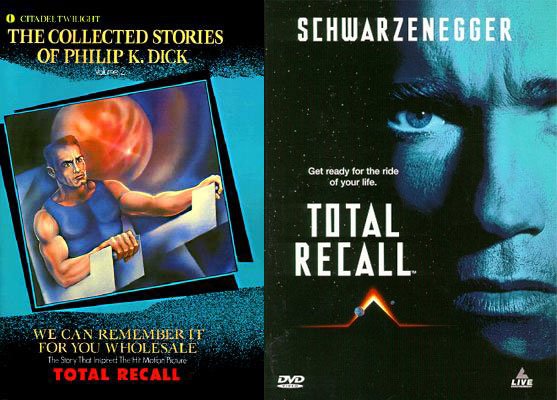Welcome to the next in our series of “Have You Watched a Good Book Lately?”
The series’ intention is to track a number of books’ progression from the printed page to the silver screen and assess how well or how badly the filmmakers accomplished each of the adaptations.

When a man goes for virtual vacation memories of the planet Mars, an unexpected and harrowing series of events forces him to go to the planet for real – or does he?
Today we’re going to be discussing “We Can Remember it for You Wholesale,” a short story written by Philip K. Dick that was first published in Fantasy & Science Fiction in 1966 and nominated for the Nebula Award the following year; and was used as the inspiration for the 1990 movie “Total Recall” with writers Ronald Shusett, Dan O’Bannon, Gary Goldman, and Jon Povill and director Paul Verhoeven (“Robocop,” “Basic Instinct,” “Starship Troopers”). For those of you unfamiliar with the basic premise, here is a brief synopsis, first of the story (adapted from literature.wikia.com) and then the film (taken from imdb.com):
“Douglas Quail, an ordinary government clerk with an unexciting life, suffers from a strong compulsion to visit Mars. It has been a life-long ambition, yet the trip is quite impossible on a clerk’s salary. Still unable to let go of his obsession, Quail makes an appointment at Rekal, Incorporated.
Rekal (pronounced recall) is a company offering extra-factual memory implantation services. Based on his fantasies, Quail would receive recall of a two-week trip to Mars as an undercover agent for Interplan. In addition, he would be supplied with a ticket stub, postcards, and other items to support the false memory, and the implant will be more convincing than an authentic one. Quail makes the decision to try the procedure.”
“When a man goes for virtual vacation memories of the planet Mars, an unexpected and harrowing series of events forces him to go to the planet for real – or does he?”
Note: For the purposes of this review, we will be using the 1990 film version, not the 2012 remake.

From the Source’s Mouth
Let’s start our discussion with one of the main concerns of any story adaptation – how true is the film to the source material? It’s important to note that the opening credits read “inspired by” Dick’s story, not “based on.” The original story was only about fifteen pages long, and for the purposes of a two-hour movie, the filmmakers needed to flesh out the material quite a bit. They chose to keep the elements of a memory-implantation company, the character’s obsession with Mars, some of his desire to be a secret agent, and a childhood wish to save the world, but they created a wider, more vivid canvas on which these could play out. The film was full of action, color, and a larger-than-life character arc that made it ideal for the big screen.
In the story, Douglas Quail is a lowly clerk, one who dreams about going to Mars but knows he could never afford it with his salary; he also fantasizes about being a secret agent with Interplan. One day, he passes by the offices of Rekal (pronounced RE-call), Incorporated and decides to stop in and inquire about an extra-factual memory implant. McClane, the head of operations, convinces him that the memories he’ll receive will be even better than if he had really gone himself. They’ll even supply him with mementos of his experience that will fortify those memories, and they guarantee he won’t ever recall having the procedure.
All seems to be in order when they put Quail under, but a situation quickly arises. It seems that, in trying to supply Quail with memories, the technicians uncovered some real memories that had been expertly erased from his conscious mind but which surfaced from his subconscious during the procedure. He had, in real life, already been to Mars, assigned there as an Agent for Interplan. This was why his desire to go to the Red Planet had been so intense. McClane orders Quail’s memories erased – again – half his money returned, and then sent on his way.
But, things don’t go quite as planned. Memories start to surface about the maw worms Quail remembers smuggling in through customs on his way home from Mars, and when he reaches for their box in his pocket, he finds the money that Rekal had refunded him. That sends him back to the company, angry that his memory-implant didn’t work. McClane simply tells Quail that the procedure failed, returns the rest of his money, and suggests it would be best if he forget the wisps of memory still there. But that doesn’t go as planned, either, as returning home he discovers the very real box of maw worms sitting in his desk drawer.

And then the Interplan Agents come in. They had been tracking him and were reading his thoughts through a transceiver in his head. Upset that the memory wipe hadn’t taken, and that he now remembers his very-real assassination of a Martian agent, they are ready to kill him off. They don’t want to do another memory wipe because they know he’ll just get restless again and seek out another company like Rekal. “Suppose once my authentic memories have been canceled, something more vital than standard memories are implanted?” he interjects quickly. “Something which would act to satisfy my craving.” They agree to look in to it, and the Agency psychiatrist stumbles across a fantasy in Quail’s brain, long since consciously forgotten, where he saves the world from an alien invasion – a true hero. “You halt the invasion, but not by destroying them. Instead, you show them kindness and mercy, even though by telepathy you know why they have come. They have never seen such humane traits exhibited by any sentient organism, and to show their appreciation they make a covenant with you,” the doctor suggests. “They won’t invade Earth as long as I’m alive,” Quail agrees, understanding. Back at Rekal, things don’t go quite as planned – again. When they try the procedure, memories surface about the aliens, who, as it turns out, really did invade Earth, only to be stopped by Quail as a young boy. He even has a scroll written in their language to prove it. Now they really have no choice but to keep him alive, for the survival of the entire human race.
The film starts out in much the same way. Douglas Quaid (played by Arnold Schwarzenegger) is a construction worker who has nightly dreams about Mars. His doting wife, Lori (played by Sharon Stone), is ostensibly jealous of the attractive brunette who frequents those dreams. She’s also less-than-thrilled about her husband’s obsession with the Red Planet, which includes watching all the news reports from there about the terrorist attacks on the turbidium mines and the general planetary unrest. But he’s insistent. “I feel like I was meant to be more than this,” he tells Lori, “to be somebody.”
On the subway, Quaid sees an ad for Rekal, and he drops in to see what they have to offer. He enquires about the Mars package, but McClane, a real salesman, convinces him to pony up the extra money for an “ego trip” add-on – he can be anybody or anything he chooses to be during his vacation. He decides on “secret agent.” Things go south when they start the procedure, though. He suffers what’s termed a “schizoid embolism,” screaming at them about blowing his cover and insisting his name’s not Quaid. The doctor knows they’ve uncovered a memory because they hadn’t yet implanted the ego trip. In the meantime, though, this being a Schwarzenegger movie, he gets extremely violent, killing most of the technicians in his rage before he escapes the facility.

We Can Remember You Wholesale book cover and Total Recall poster
Non-Standard Deviations
It’s at this point that the short story and the film start splitting ways. Quaid returns home, trying to tell Lori about this vast conspiracy, only to have her try to kill him. It seems that she’s not really his wife, only someone from Mars Intelligence who’s been tasked with babysitting him to make sure the memory wipe took. Quaid escapes just before reinforcements arrive, with the help of a friend who gives him a gadget-laden suitcase in which he discovers a pre-recorded message from – himself. The message tells him that he’s really someone named Hauser; that he had worked for Vilos Cohaagen, the director of Mars Intelligence; and that he’d switched sides to support the rebels now attacking the mines. He explains how to remove the tracking device in his head and escape from the agents currently pursuing him, as well as how to make it safely back to Mars.
Once on Mars, the film turns into a convoluted action-adventure film that contains shootouts, switches and double-switches, lots of explosive decompression sequences, and chase scenes galore. Quaid/Hauser also meets up with Melina, the brunette of his dreams (played by Rachel Ticotin) – it turns out she was not a dream but was an actual memory so strong that she rose to the surface even before Rekal. She sets up a meeting with the rebel leader, a mutant telepath named Kuato. He’s determined to help Quaid recall all his memories from when he was Hauser so the rebels can wrest control of the planet from Cohaagen’s iron grip. Those memories are fraught with shocking truths and increased danger, even as Cohaagen’s cronies are hot on Quaid’s tail. Ultimately, though, Quaid prevails, activating an alien artifact discovered in the mines that transforms Mars into a living, habitable planet. In a nice twist from the story, he doesn’t save humans from an alien invasion, but he uses alien technology to save humanity from other, unscrupulous humans. Again, he becomes the hero that saves the world, even if he didn’t originally set out to do that.
What was interesting about Verhoeven’s adaptation is that, while it wasn’t a slavish copy of the original story, it was faithful to its spirit while building a world that was hyper-real, highly color-saturated, and visually stunning, with an almost comic bookish approach both to violence and to sensory experience. The characters, the planet, and the action sequences are all larger-than-life, as befits a big screen experience (and, to be fair, a Schwarzenegger film). Even the opening credits give us a taste of what’s to come: each new credit slides down the screen in vivid streaks of color, leaving traces of its “memory” behind on the screen. And Jerry Goldsmith’s divine score was at the same time layered with different character and action themes, pulse-pounding sequences for the chases and gunplay, and a swelling conclusion for the final confrontation of man against man against machine for control of the Red Planet.

Book or film – we tell you.
The Final Cut
So, how did “Total Recall” as a movie fare as a short story adaptation overall? While clearly it was an “inspired by” and not a “based on” adaptation, it drew heavily from the source material for its base while going far beyond the original to create a movie that could easily stand on its own; it’s a textbook case of how to do a film adaptation well. I’d give it a solid A for effort and ingenuity.
What do you think? Do you agree? Disagree? Please add your comments in the section below.
– Miriam Ruff, Content Creator, PoetsIN
DISCLAIMER: The opinions discussed in this blog post are solely those of the blogger and do not necessarily represent any thoughts, values, or opinions of PoetsIN and any of its affiliate groups.
Please follow and like us:
Welcome to the next in our series of “Have You Watched a Good Book Lately?”
The series’ intention is to track a number of books’ progression from the printed page to the silver screen and assess how well or how badly the filmmakers accomplished each of the adaptations.
When a man goes for virtual vacation memories of the planet Mars, an unexpected and harrowing series of events forces him to go to the planet for real – or does he?
Today we’re going to be discussing “We Can Remember it for You Wholesale,” a short story written by Philip K. Dick that was first published in Fantasy & Science Fiction in 1966 and nominated for the Nebula Award the following year; and was used as the inspiration for the 1990 movie “Total Recall” with writers Ronald Shusett, Dan O’Bannon, Gary Goldman, and Jon Povill and director Paul Verhoeven (“Robocop,” “Basic Instinct,” “Starship Troopers”). For those of you unfamiliar with the basic premise, here is a brief synopsis, first of the story (adapted from literature.wikia.com) and then the film (taken from imdb.com):
“Douglas Quail, an ordinary government clerk with an unexciting life, suffers from a strong compulsion to visit Mars. It has been a life-long ambition, yet the trip is quite impossible on a clerk’s salary. Still unable to let go of his obsession, Quail makes an appointment at Rekal, Incorporated.
Rekal (pronounced recall) is a company offering extra-factual memory implantation services. Based on his fantasies, Quail would receive recall of a two-week trip to Mars as an undercover agent for Interplan. In addition, he would be supplied with a ticket stub, postcards, and other items to support the false memory, and the implant will be more convincing than an authentic one. Quail makes the decision to try the procedure.”
“When a man goes for virtual vacation memories of the planet Mars, an unexpected and harrowing series of events forces him to go to the planet for real – or does he?”
Note: For the purposes of this review, we will be using the 1990 film version, not the 2012 remake.
From the Source’s Mouth
Let’s start our discussion with one of the main concerns of any story adaptation – how true is the film to the source material? It’s important to note that the opening credits read “inspired by” Dick’s story, not “based on.” The original story was only about fifteen pages long, and for the purposes of a two-hour movie, the filmmakers needed to flesh out the material quite a bit. They chose to keep the elements of a memory-implantation company, the character’s obsession with Mars, some of his desire to be a secret agent, and a childhood wish to save the world, but they created a wider, more vivid canvas on which these could play out. The film was full of action, color, and a larger-than-life character arc that made it ideal for the big screen.
In the story, Douglas Quail is a lowly clerk, one who dreams about going to Mars but knows he could never afford it with his salary; he also fantasizes about being a secret agent with Interplan. One day, he passes by the offices of Rekal (pronounced RE-call), Incorporated and decides to stop in and inquire about an extra-factual memory implant. McClane, the head of operations, convinces him that the memories he’ll receive will be even better than if he had really gone himself. They’ll even supply him with mementos of his experience that will fortify those memories, and they guarantee he won’t ever recall having the procedure.
All seems to be in order when they put Quail under, but a situation quickly arises. It seems that, in trying to supply Quail with memories, the technicians uncovered some real memories that had been expertly erased from his conscious mind but which surfaced from his subconscious during the procedure. He had, in real life, already been to Mars, assigned there as an Agent for Interplan. This was why his desire to go to the Red Planet had been so intense. McClane orders Quail’s memories erased – again – half his money returned, and then sent on his way.
But, things don’t go quite as planned. Memories start to surface about the maw worms Quail remembers smuggling in through customs on his way home from Mars, and when he reaches for their box in his pocket, he finds the money that Rekal had refunded him. That sends him back to the company, angry that his memory-implant didn’t work. McClane simply tells Quail that the procedure failed, returns the rest of his money, and suggests it would be best if he forget the wisps of memory still there. But that doesn’t go as planned, either, as returning home he discovers the very real box of maw worms sitting in his desk drawer.
And then the Interplan Agents come in. They had been tracking him and were reading his thoughts through a transceiver in his head. Upset that the memory wipe hadn’t taken, and that he now remembers his very-real assassination of a Martian agent, they are ready to kill him off. They don’t want to do another memory wipe because they know he’ll just get restless again and seek out another company like Rekal. “Suppose once my authentic memories have been canceled, something more vital than standard memories are implanted?” he interjects quickly. “Something which would act to satisfy my craving.” They agree to look in to it, and the Agency psychiatrist stumbles across a fantasy in Quail’s brain, long since consciously forgotten, where he saves the world from an alien invasion – a true hero. “You halt the invasion, but not by destroying them. Instead, you show them kindness and mercy, even though by telepathy you know why they have come. They have never seen such humane traits exhibited by any sentient organism, and to show their appreciation they make a covenant with you,” the doctor suggests. “They won’t invade Earth as long as I’m alive,” Quail agrees, understanding. Back at Rekal, things don’t go quite as planned – again. When they try the procedure, memories surface about the aliens, who, as it turns out, really did invade Earth, only to be stopped by Quail as a young boy. He even has a scroll written in their language to prove it. Now they really have no choice but to keep him alive, for the survival of the entire human race.
The film starts out in much the same way. Douglas Quaid (played by Arnold Schwarzenegger) is a construction worker who has nightly dreams about Mars. His doting wife, Lori (played by Sharon Stone), is ostensibly jealous of the attractive brunette who frequents those dreams. She’s also less-than-thrilled about her husband’s obsession with the Red Planet, which includes watching all the news reports from there about the terrorist attacks on the turbidium mines and the general planetary unrest. But he’s insistent. “I feel like I was meant to be more than this,” he tells Lori, “to be somebody.”
On the subway, Quaid sees an ad for Rekal, and he drops in to see what they have to offer. He enquires about the Mars package, but McClane, a real salesman, convinces him to pony up the extra money for an “ego trip” add-on – he can be anybody or anything he chooses to be during his vacation. He decides on “secret agent.” Things go south when they start the procedure, though. He suffers what’s termed a “schizoid embolism,” screaming at them about blowing his cover and insisting his name’s not Quaid. The doctor knows they’ve uncovered a memory because they hadn’t yet implanted the ego trip. In the meantime, though, this being a Schwarzenegger movie, he gets extremely violent, killing most of the technicians in his rage before he escapes the facility.
We Can Remember You Wholesale book cover and Total Recall poster
Non-Standard Deviations
It’s at this point that the short story and the film start splitting ways. Quaid returns home, trying to tell Lori about this vast conspiracy, only to have her try to kill him. It seems that she’s not really his wife, only someone from Mars Intelligence who’s been tasked with babysitting him to make sure the memory wipe took. Quaid escapes just before reinforcements arrive, with the help of a friend who gives him a gadget-laden suitcase in which he discovers a pre-recorded message from – himself. The message tells him that he’s really someone named Hauser; that he had worked for Vilos Cohaagen, the director of Mars Intelligence; and that he’d switched sides to support the rebels now attacking the mines. He explains how to remove the tracking device in his head and escape from the agents currently pursuing him, as well as how to make it safely back to Mars.
Once on Mars, the film turns into a convoluted action-adventure film that contains shootouts, switches and double-switches, lots of explosive decompression sequences, and chase scenes galore. Quaid/Hauser also meets up with Melina, the brunette of his dreams (played by Rachel Ticotin) – it turns out she was not a dream but was an actual memory so strong that she rose to the surface even before Rekal. She sets up a meeting with the rebel leader, a mutant telepath named Kuato. He’s determined to help Quaid recall all his memories from when he was Hauser so the rebels can wrest control of the planet from Cohaagen’s iron grip. Those memories are fraught with shocking truths and increased danger, even as Cohaagen’s cronies are hot on Quaid’s tail. Ultimately, though, Quaid prevails, activating an alien artifact discovered in the mines that transforms Mars into a living, habitable planet. In a nice twist from the story, he doesn’t save humans from an alien invasion, but he uses alien technology to save humanity from other, unscrupulous humans. Again, he becomes the hero that saves the world, even if he didn’t originally set out to do that.
What was interesting about Verhoeven’s adaptation is that, while it wasn’t a slavish copy of the original story, it was faithful to its spirit while building a world that was hyper-real, highly color-saturated, and visually stunning, with an almost comic bookish approach both to violence and to sensory experience. The characters, the planet, and the action sequences are all larger-than-life, as befits a big screen experience (and, to be fair, a Schwarzenegger film). Even the opening credits give us a taste of what’s to come: each new credit slides down the screen in vivid streaks of color, leaving traces of its “memory” behind on the screen. And Jerry Goldsmith’s divine score was at the same time layered with different character and action themes, pulse-pounding sequences for the chases and gunplay, and a swelling conclusion for the final confrontation of man against man against machine for control of the Red Planet.
Book or film – we tell you.
The Final Cut
So, how did “Total Recall” as a movie fare as a short story adaptation overall? While clearly it was an “inspired by” and not a “based on” adaptation, it drew heavily from the source material for its base while going far beyond the original to create a movie that could easily stand on its own; it’s a textbook case of how to do a film adaptation well. I’d give it a solid A for effort and ingenuity.
What do you think? Do you agree? Disagree? Please add your comments in the section below.
– Miriam Ruff, Content Creator, PoetsIN
DISCLAIMER: The opinions discussed in this blog post are solely those of the blogger and do not necessarily represent any thoughts, values, or opinions of PoetsIN and any of its affiliate groups.
admin